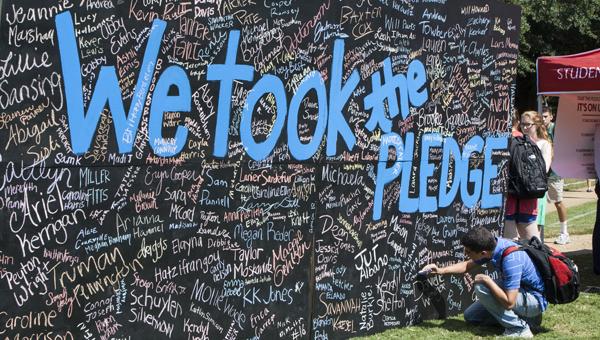Sexual assault is often a difficult topic to speak about, especially for those of us who are survivors. We do not choose to share a personal story in this article, as it would most likely be exploited and undermined for faux campus initiatives.
The “It’s On Us” initiative on our campus has done nothing to eliminate rape culture and has only perpetuated it. It is impossible to end sexual assault without first addressing the social mechanisms on which it thrives. One doesn’t have to be a scholar in feminist theory to realize that the toxic representations of women in the media and general attitudes towards women and members of the LGBTQ+ community on campus create a culture where victims feel responsible for their attacks and perpetrators feel justified.
The first meeting of “It’s On Us” that a representative of UA Feminist Caucus attended featured a speaker from the Women and Gender Resource Center explaining the extent of rape culture as it relates to our campus, with suggested measures of bystander intervention. Her lesson was extremely helpful in dismantling rape culture and preventing sexual assault through the use of societal pressure, and some of the suggestions from the group were encouraging. However, as women who have a 1 in 5 chance of facing sexual assault (notwithstanding other factors such as race and gender identity) during our college experiences, the initiative has only left us concerned.
When it has been proven that membership in a social fraternity significantly contributes to the likelihood of perpetrating sexual assault, it is difficult not to be wary of an initiative spearheaded by greek students. Initially, we gave it the benefit of the doubt, thinking, “Who better to solve this problem than those who are prominent within it?” However, Jordan Forrest’s article about her project stated “We do not let our friends walk alone late at night or ignore their requests for a designated driver. We hold our friends and ourselves accountable, and we never blame the victim.” While we admire the intentions of those who came together to write these articles and lead this initiative, it must be noted that the very sentence that warns us not to blame the victim is preceded by victim-blaming through false notions of “accountability.” The goal of this initiative was to create a culture of accountability, but this accountability seems to be only for those more likely to be targeted rather than those who may perpetrate it.
This is one of the main problems of “It’s On Us.” At the first meeting, some members of the task force suggested solutions to a hypothesized situation including a man displaying potentially aggressive behavior towards a woman at a bar. Their solutions included interrupting him or trying to distract him while simultaneously taking care not to offend him. Without sternly expressing that this behavior is threatening and unacceptable, we challenge nothing and change nothing, hardly providing the safety that the initiative claims to create.
Another “solution” of the campaign that assisted in victim-blaming was the campus walk. Members of the task force walked around campus after dark and pointed out places that could be more well-lit. This is problematic because women (as the campaign frequently assumes all victims are cis women) should not have to walk in large groups or in well-lit places to avoid being assaulted. We should not be responsible for preventing violence against ourselves. The only suitable way to prevent sexual assault is to teach people not to sexually assault others. Providing better lighting is treating a symptom of a larger epidemic, and an ironic approach considering the University’s late-night shuttle service hardly works.
Secondly, this idea of “stranger danger,” in which women are only attacked at night by “bad guys” is a false notion. Eighty-two percent of assaults are perpetrated by someone the victim knows, including their intimate partners or spouses. The walk, as well as the whole campaign, did little but give a group of people two hours of self-righteousness while doing nothing but furthering myths about sexual assault.
It goes without saying that no one was inspired to come forth and tell their story at any of the events for “It’s On Us.” To foster true change, our campus needs to listen to victims, rather than blame and criticize them, and remind them that they are more than their assault or merely a story to use as our own resume-builder. We need to have a solid pushback on men who refer to women as sexual objects. We need to focus less on what White House initiative we can complacently adopt, but rather on our own specific needs, catered to our own environment.
This starts with recognizing where we are failing. We need more campaigns that publicly promote consistent training about consent, frequently muddled at this university, along with fully-inclusive sex education, which is much harder than signing a wall on the Quad and then returning to a life of perpetuating violence. We need to analyze the deepest parts of rape culture, not just scrape the surface. Ending the stigma about women’s sexuality and the social construct of virginity are good starting points. From there, we can expand into heteronormative expectations of men and women within the gender binary and then further into queer and trans erasure. By following this progression, eventually we can manage to achieve what seems to be the impossible: the destruction of a culture that justifies and covers up sexual assault.
While the idea behind “It’s On Us” is well-intentioned, our campus’s handling of it has been nothing more than a moment of self-glorification. Fixing this complex issue requires difficult self-reflection on the part of every individual on this campus.
Lindsay Macher, Cameron Ridgeway, Jessica Morgan, Jilisa Milton, Rachel Ledbetter, and Isabelle Beauregard are members of the UA Feminist Caucus Executive Committee. This editorial represents the views of all writers.







